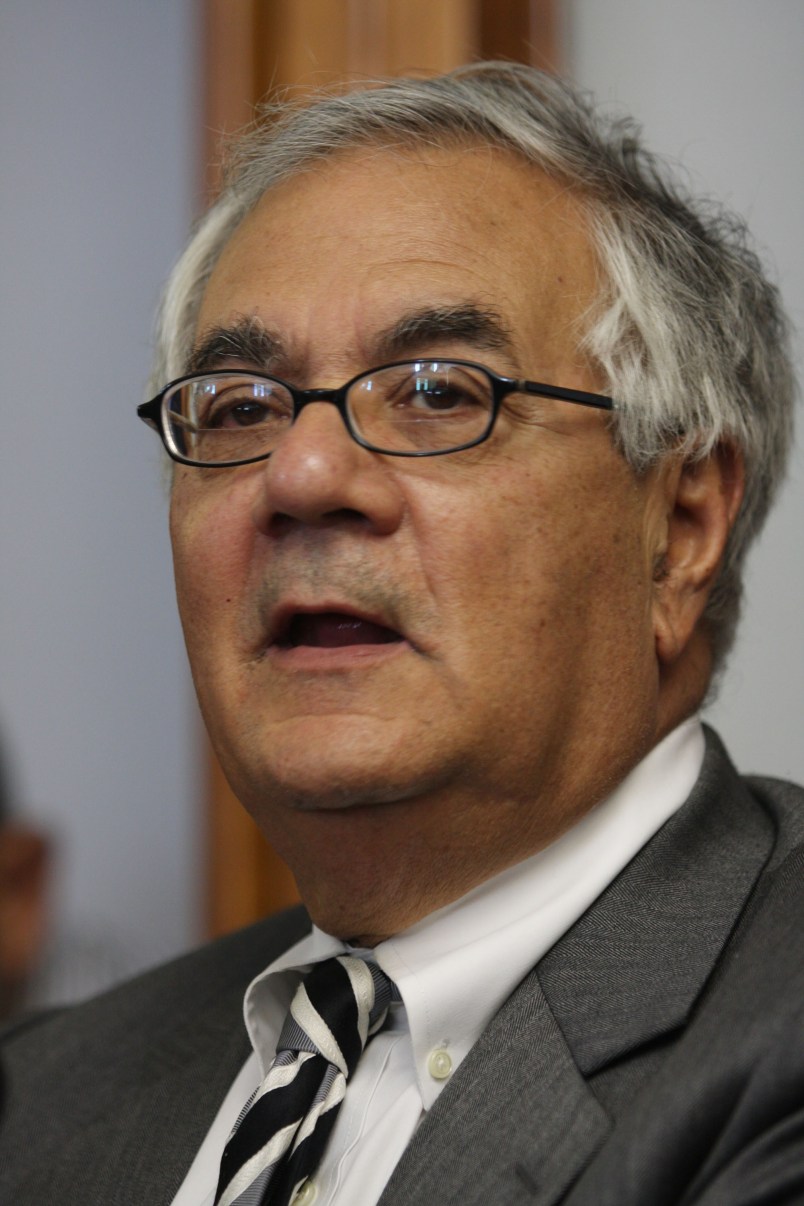In an interview with TPMDC this evening, Rep. Barney Frank (D-MA) reversed course–apologizing for a harsh statement he released last night in the wake of the Massachusetts special election, and saying, explicitly, that if he’s assured the bill will be fixed down the line, he’d vote for the Senate health care bill.
“I’m easy. I’m strongly inclined to vote for the thing, even though I don’t like the health care tax thing,” Frank told me. “But you know, I was ready to vote for the bill when I had people on the left yelling at me not to vote for it. So you know I’ll vote for any of it… to try and move the process along.”
Frank was quick to qualify his remarks, though, noting that a vote from him would require promises from leadership and the White House that at least one controversial element of the legislation would be fixed in subsequent legislation. “I take it back…I would want assurances that we were going to amend the health care tax piece,” Frank said.
Last night, Frank cast significant doubt on whether Democrats could conceivably pass a health care bill at all. In a statement issued after Sen.-elect Scott Brown’s (R-MA) victory last night, Frank said “I am hopeful that some Republican senators will be willing to discuss a revised version of health care reform. Because I do not think that the country would be well served by the health care status quo. But our respect for democratic procedures must rule out any effort to pass a health care bill as if the Massachusetts election had not happened.”
That statement created a bit of confusion: Did Frank think the election was a referendum on health care and that Democrats should abandon the plan? Or did he simply think it would be inappropriate of Democrats to ram a compromise bill through the Senate in the window between Brown’s victory and his swearing in. Tonight, Frank laid any doubt to rest.
“I should not have put out a statement late in the evening last night when I was upset because I didn’t really–I think I overstated the pessimism,” Frank told me. “I really was worried–I put out a new statement–I was worried about some Democrats doing crazy things, like ‘don’t seat him’, ‘let Kirk’s vote go.’ I was worried about that.”
Frank laid out a specific, potential way forward for health care, which he acknowledged would be fraught with difficulty. But, he noted, if it fails, Democrats should return to the Senate and ask one moderate Republican if she really wants to be the person who says, “no way, no how,” to health care reform.
“The one thing is–you might be able to get the Senate bill through the House if there were assurances and agreement on what subsequent amendments would be,” Frank said. “That’s going to be very tricky, but that’s one possibility.”
Frank is talking, roughly, about Plan B, which Democrats have been discussing since the electoral situation in Massachusetts began looking dire. How exactly would that work? Frank explained:
“You have to pass the Senate bill as is and the President signs it. Then people have to be assured that you can get the amendments through the House and the Senate,” Frank said. “Because then the argument would be, ‘Look, the bills already passed so now the question is whether you’re willing to amend it or not.'”
One way to do that would be through the filibuster proof budget reconciliation process. “The alternative would be, people are talking about using reconciliation: 51 votes to get the agreed on amendments in the Senate.”
The problem, Frank noted, is that reconciliation can only be used for some measures–revenue and spending measures, with implications for the federal budget–and not others. Some elements of the fix, then, could be passed through reconciliation, requiring only a simple majority in the Senate. The trick would be to get the other contentious measures–abortion, immigration–fixed through the regular order.
“Those would need 60 [in the Senate]–and the question is can you get the House votes without the assurance that you’re going to get those.”
So what if it fails? What if, despite these hypothetical assurances, the House can’t muster the votes for the bill? Frank says, look to Maine.
“I just had somebody in Maine tell me this–I wonder whether Olympia Snowe wants to be the person who says nothing happens,” Frank told me. “It’s one thing for her to vote no when she thought it was going to pass.”
I think people are underestimating the pressure people like Olympia Snowe are going to feel. She voted for a version of it. Is she going to want to say, “Never ever ever, and I’m in charge of their not having been any change, and pre-existing conditions, and lifetime caps, etc etc.”
Frank says if Democrats can’t seal the deal on health care reform, they may still be able to accomplish other agenda items like financial regulatory reform, and jobs legislation. But, he said, a success on health care reform, without abrogating the accepted norms in Congress, would be much better politically than outright failure.
“A bill being passed [is in Democrats’ best interest]–as long as it’s being done in a way that’s invulnerable to charges that it was jammed through, or the rules were disregarded. That’s what I was afraid of was a disregard for the procedural rules: Bending the Byrd rule out of shape, or doing something with Paul Kirk’s vote while awaiting certification–those things would be fatal.”
Democrats will huddle to discuss plausible ways forward tomorrow morning. Speaking as one of the members who left last night’s health care caucus feeling pessimistic and aggrieved, he thinks fellow progressives and other Democrats will be calmer tomorrow, having had a chance to mull things and come to terms with the new reality.
“It’s probably better.”
The atmosphere will be better?
“Yeah.”










